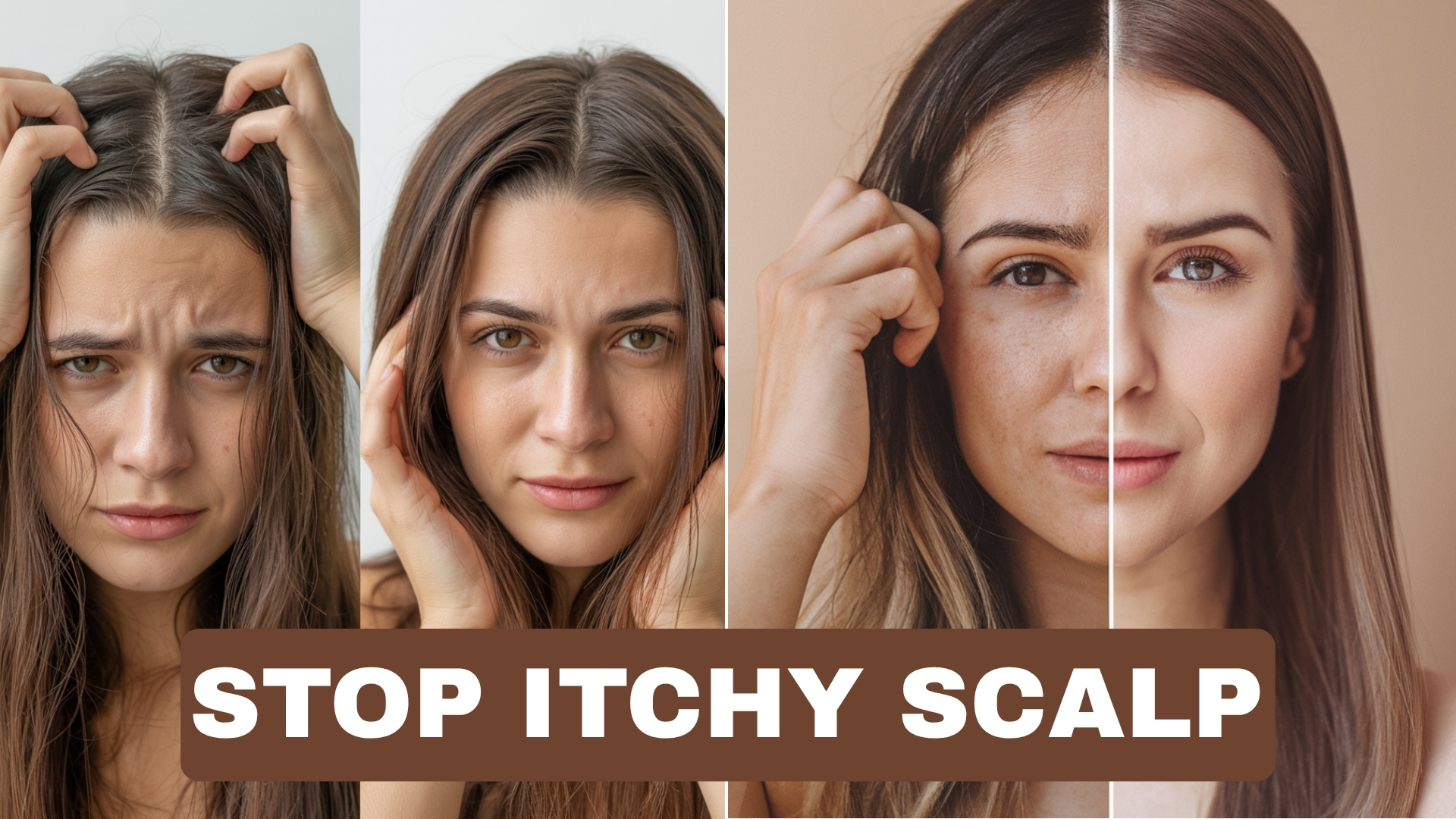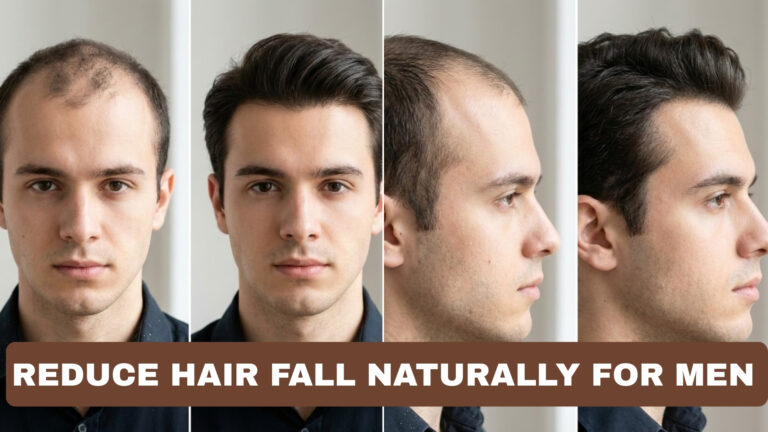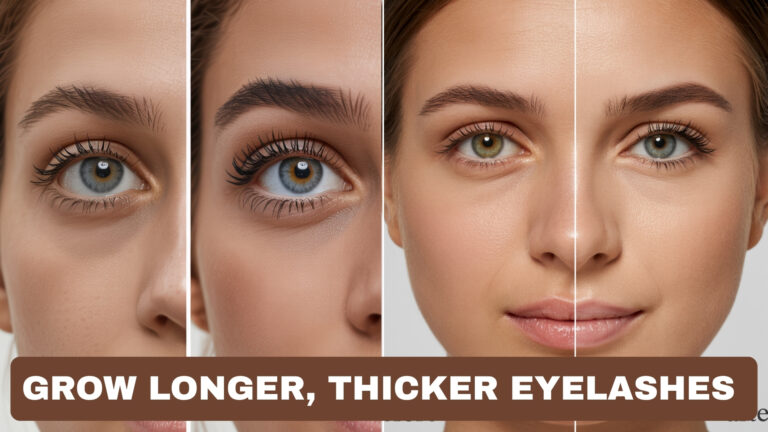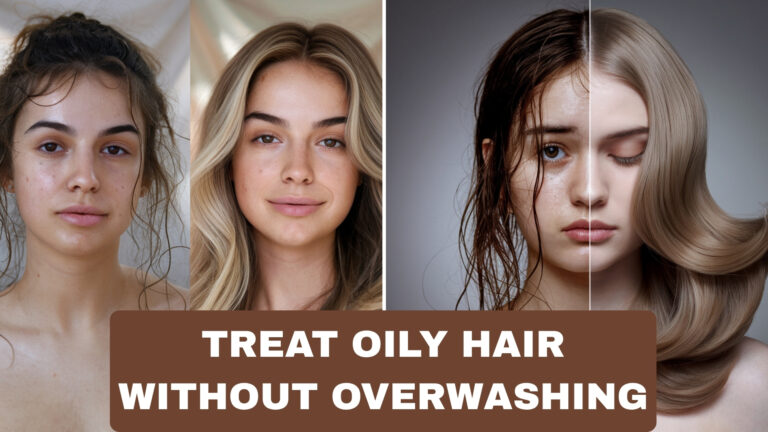An itchy scalp is one of those tiny, nagging problems that can steal your focus (and make you scratch at the worst moments). The good news: many causes are common and treatable at home, and small changes to how you wash, what you put on your head, and what you eat can make a big difference. Below you’ll find a thorough, practical guide covering causes, when to worry, common mistakes, step-by-step natural remedies, essential oils, DIY masks, washing technique, product guidance, diet tips, and clear signs that you should see a clinician.
I cite trustworthy sources for the most important medical facts so you can read further if you like. Cleveland Clinic+2Mayo Clinic+2
Quick safety notes before we begin
- Always patch-test new topical remedies (apply a small amount behind your ear; wait 24 hours).
- Stop any home remedy that burns, causes redness, swelling, or worsens symptoms.
- If your scalp is blistered, bleeding, oozing, or losing hair rapidly, see a healthcare provider promptly. Cleveland Clinic
What Causes an Itchy Scalp?
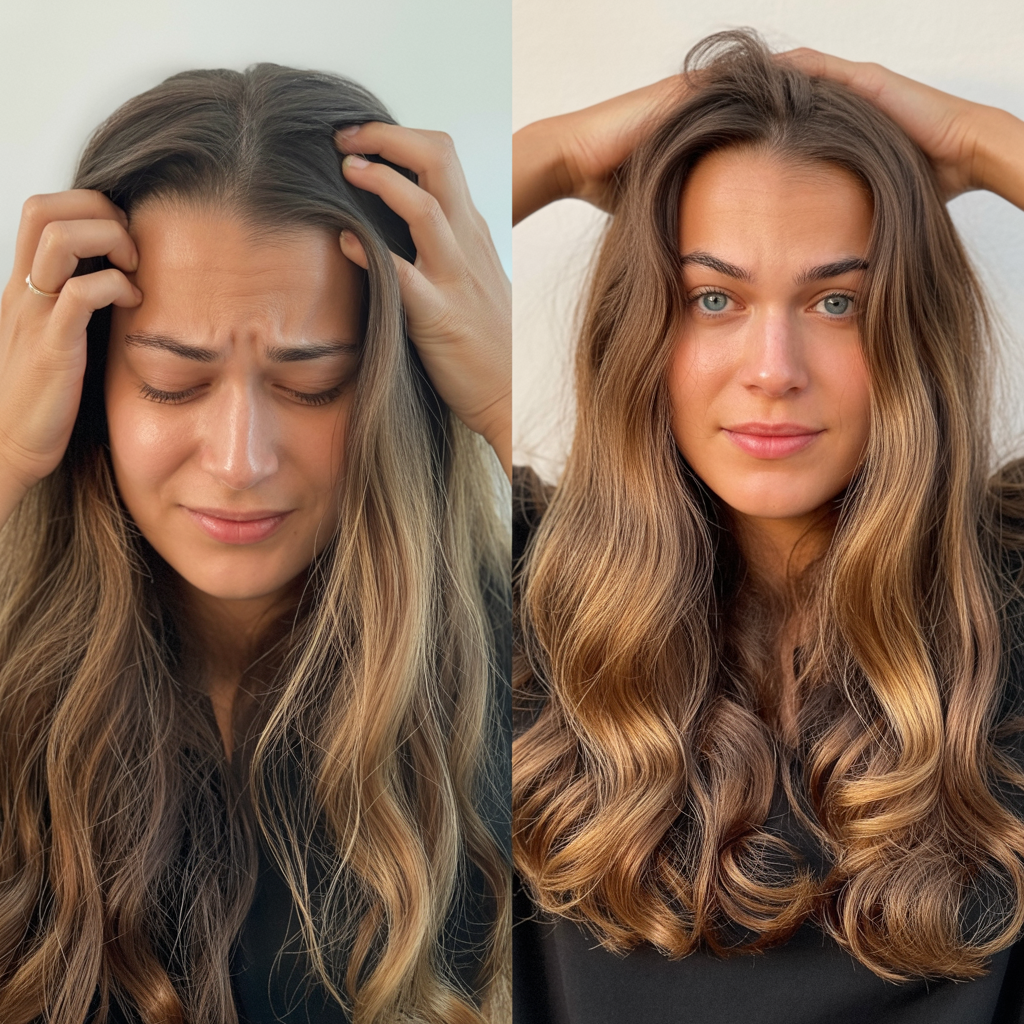
Here are the most common causes (brief, with what you’ll likely notice):
- Seborrheic dermatitis / dandruff — flaky, oily, itchy patches; very common and often linked to an overgrowth of a normal scalp yeast. (Probably the single most common cause.) Cleveland Clinic+1
- Dry skin — small dry flakes, itch but less oiliness than dandruff.
- Contact/allergic dermatitis — redness, burning or itching after a product (hair dye, shampoo ingredient, fragrance). American Academy of Dermatology
- Psoriasis — thicker, silvery or scaly plaques that can be itchy or sore. nhs.uk
- Fungal infection (ringworm / tinea capitis) — localized scaly patches and sometimes broken hair.
- Head lice, scabies, insect bites — intense itching, often worse at night; lice are visible on inspection.
- Folliculitis or bacterial infections — red, tender bumps or pustules.
- Systemic causes — nutritional deficiencies (iron, vitamins), thyroid problems, or reactions to medications can also cause scalp itch. PMC
If you want the short version: seborrheic dermatitis/dandruff and contact dermatitis are huge contributors — but the exact cause matters because treatment differs. Cleveland Clinic
Is an Itchy Scalp a Sign of a Scalp Problem?
Sometimes yes — and sometimes no.
- Occasional itch after sweating, sun, or a new product is common and often temporary.
- Persistent or severe itch (weeks, associated with flaking that doesn’t improve, redness, hair loss, sores, or spreading beyond the scalp) is more likely a medical condition that needs targeted treatment (e.g., medicated shampoos, prescription creams, or antifungals). Mayo Clinic+1
When to see a clinician right away: fever with scalp symptoms, pus or open sores, rapidly spreading rash, significant hair loss, or if home care for 2–4 weeks fails. Cleveland Clinic
Common Mistakes That Make Scalp Itching Worse
Avoid these common traps:
- Over-washing or under-washing. Washing too often can strip oils and dry the scalp; not washing enough lets oil, sweat, and yeasts build up. Frequency should match your scalp type (see section 7). Mayo Clinic News Network
- Using harsh ingredients (strong sulfates, fragrances, PPD in dyes) — these can irritate or sensitize the scalp. American Academy of Dermatology
- Scratching hard. Scratching increases inflammation and can lead to infection. Trim nails and use soothing measures instead.
- Applying undiluted essential oils or acidic “home cleansers” (like straight vinegar or baking soda paste) — these can burn or disrupt the skin barrier if used incorrectly. Patch test and dilute. PMC
- Ignoring the underlying cause. Treating flakes with generic conditioners only delays proper therapy if you have psoriasis, tinea capitis, or seborrheic dermatitis. Mayo Clinic
Natural Home Remedies to Stop Scalp Itching (practical, step-by-step)
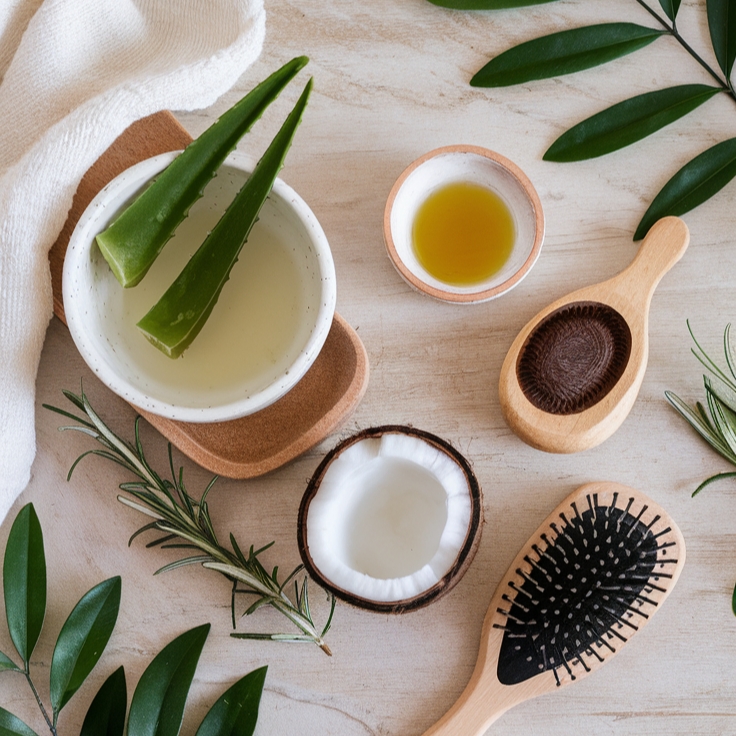
Below are gentle, commonly used natural measures that many people find helpful. For each, I give a short recipe and safety notes.
A. Aloe vera soothing rinse
Why: Aloe is cooling and may reduce inflammation.
How:
- Use pure aloe vera gel (store-bought pure gel or the inner leaf).
- Apply a small amount to the itchy scalp, gently massage for 1–2 minutes.
- Leave for 20–30 minutes, then rinse with lukewarm water.
Frequency: 2–3× weekly.
Caution: Patch test first.
B. Apple cider vinegar (ACV) rinse — balancing pH & removing buildup
Why: ACV may help remove residue and restore slightly acidic pH, which can reduce itch for some people.
How:
- Mix 1 part ACV to 3–4 parts water (weaker for sensitive scalps).
- After shampooing, pour over scalp, massage gently for 60 seconds, then rinse.
Frequency: once weekly to start.
Caution: never use undiluted ACV; avoid on broken skin or open sores. Verywell Health
C. Tea tree oil (diluted) — antimicrobial support
Why: Tea tree oil has antimicrobial properties and can help dandruff for some people. Evidence is promising but not guaranteed. PubMed
How:
- Add 3–5 drops of tea tree essential oil to 1 ounce of carrier oil (coconut, jojoba) or add 5–10 drops to a full bottle (250 ml) of gentle shampoo.
- Massage into scalp for 2 minutes, leave 3–5 minutes, then rinse.
Frequency: 2× weekly.
Caution: Patch test. Don’t use neat (undiluted). Avoid in small children and those with sensitive skin.
D. Coconut oil pre-wash treatment (for dry scalps)
Why: Moisturizes and may reduce fungal load slightly due to lauric acid content.
How:
- Warm 1–2 tablespoons of virgin coconut oil, massage into scalp and hair.
- Leave 30 minutes or overnight (cover pillow).
- Shampoo thoroughly to remove oil.
Frequency: 1× weekly.
E. Oatmeal cooling mask (for inflamed, itchy scalps)
Why: Colloidal oatmeal soothes skin inflammation.
How:
- Make a smooth paste of 2 tbsp colloidal oatmeal + a little water.
- Apply to itchy areas, leave 15–20 minutes, rinse gently.
Frequency: as needed.
Caution: avoid if scalp has open sores.
F. Gentle scalp massage (blood flow + oil distribution)
How:
- Use fingertips, apply light pressure, move in small circles for 3–5 minutes while shampooing or with a carrier oil.
- Helps distribute natural oils and can relieve stress-related itch.
Best Essential Oils for Itchy Scalp Relief (and how to use them safely)
Essential oils can help some people, mainly for their antimicrobial and anti-inflammatory properties — but evidence is mixed and proper dilution is essential. Always patch test.
- Tea tree oil (Melaleuca alternifolia) — best evidence among essential oils for dandruff/seborrheic dermatitis when used diluted. Use 5–10 drops per 250 ml shampoo or dilute in a carrier oil. PubMed
- Rosemary oil — traditionally used for scalp health; some small studies suggest benefits for hair and scalp. PMC
- Lavender oil — calming and may help inflammation; often blended with rosemary.
- Cedarwood / eucalyptus / peppermint — used in blends for scalp circulation and antimicrobial effects but require dilution and caution. PMC
Safe usage (do this every time):
- Mix essential oil into a carrier oil (1–2 drops of essential oil per teaspoon of carrier for sensitive scalps; up to 5 drops per teaspoon for tougher scalps).
- Patch test 24 hours.
- Apply to a small area first; avoid contact with eyes and mucous membranes.
- Do not use near infants; check pregnancy/breastfeeding safety for specific oils.
- If irritation occurs, wash immediately and stop use.
DIY Scalp Treatment Masks You Can Try at Home (recipes & steps)
1) Soothing Aloe + Oat Mask (good for irritated, inflamed itch)
Ingredients: 2 tbsp pure aloe gel, 1 tbsp colloidal oatmeal.
Steps:
- Mix into a paste.
- Apply to scalp, leave 20 minutes, rinse and shampoo gently.
Use: 1–2× weekly.
2) Tea Tree + Coconut Oil Pre-wash (dandruff prone)
Ingredients: 2 tbsp coconut oil + 5 drops tea tree oil.
Steps:
- Mix and warm slightly.
- Massage into scalp 5 minutes, leave 30–60 minutes, then shampoo twice to remove oil.
Use: weekly.
3) Apple Cider Vinegar Clarifying Rinse (removes buildup)
Ingredients: 1 part ACV : 3–4 parts water.
Steps:
- Shampoo, then pour rinse over scalp, massage 60 seconds, rinse.
- Use once weekly; reduce frequency if scalp becomes dry.
Caution: avoid on irritated/broken skin.
How to Wash Hair Correctly to Avoid Scalp Irritation — Step-by-Step
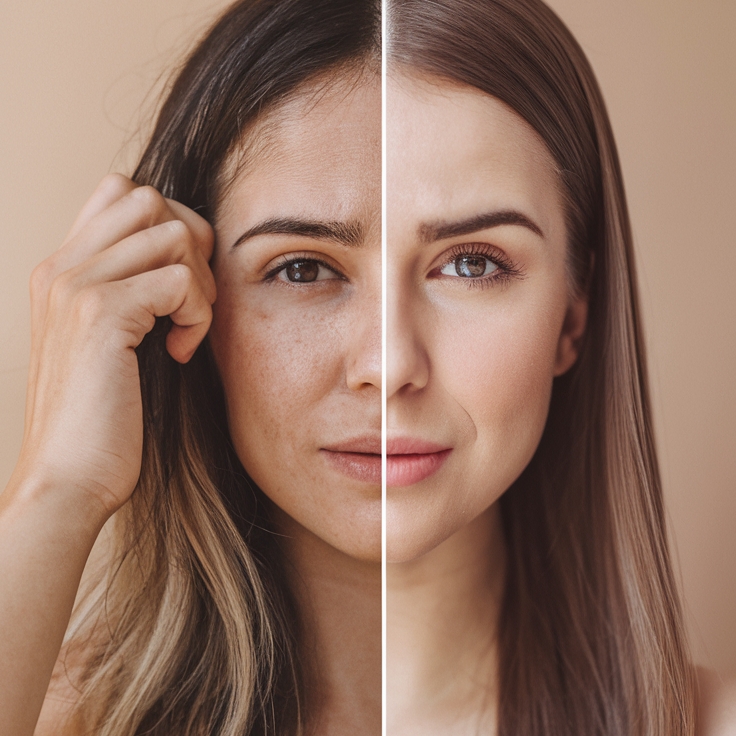
Good washing technique prevents both dryness and buildup.
- Choose the right shampoo for your scalp type (gentle, sulfate-free for sensitive/dry scalps; medicated shampoos for dandruff/seborrheic dermatitis as advised). Mayo Clinic+1
- Wet hair thoroughly with warm (not hot) water.
- Dilute shampoo in a small bowl or in your palm for even distribution (optional).
- Apply shampoo to scalp, not ends. Use fingertips (not nails), massaging gently in circular motions for 60–90 seconds to loosen flakes and distribute product.
- Rinse thoroughly. Leftover product can irritate the scalp.
- Condition the hair ends only; avoid heavy conditioners on the scalp unless product is scalp-safe.
- Rinse with cool water as a final step to close the hair cuticle if you like.
- Dry gently — pat with a towel and air-dry or use low heat. Avoid aggressive rubbing.
- Washing frequency: tailored — many people find every 2–3 days is fine; those who sweat a lot or have oily scalps may wash more; those with very dry or curly hair may go longer between washes. For dandruff/seborrheic dermatitis follow medicated shampoo directions. Mayo Clinic News Network+1
Best Natural Shampoos and Products for Itchy Scalp (what to look for)
Rather than brand shopping here, focus on ingredients and product types:
- Look for active, evidence-based anti-dandruff ingredients when needed: ketoconazole, zinc pyrithione, selenium sulfide, or salicylic acid. These work against yeast, flaking, or excess scale; use as directed. (Medicated shampoos are often the fastest way to control seborrheic dermatitis.) Mayo Clinic+1
- Natural/supportive ingredients that may soothe: tea tree (diluted), aloe vera, colloidal oatmeal, chamomile, and rosemary. These can be helpful adjuncts but are generally less potent than medicated actives. PubMed+1
- Avoid strong fragrances and unnecessary sulfates if you have sensitive or reactive scalp. American Academy of Dermatology
If you prefer “natural” brands, scan the label for the above soothing ingredients and avoid irritating alcohols/fragrance allergens. If symptoms persist despite “natural” care, medicated options may be necessary.
Diet and Hydration Tips for a Healthy Scalp
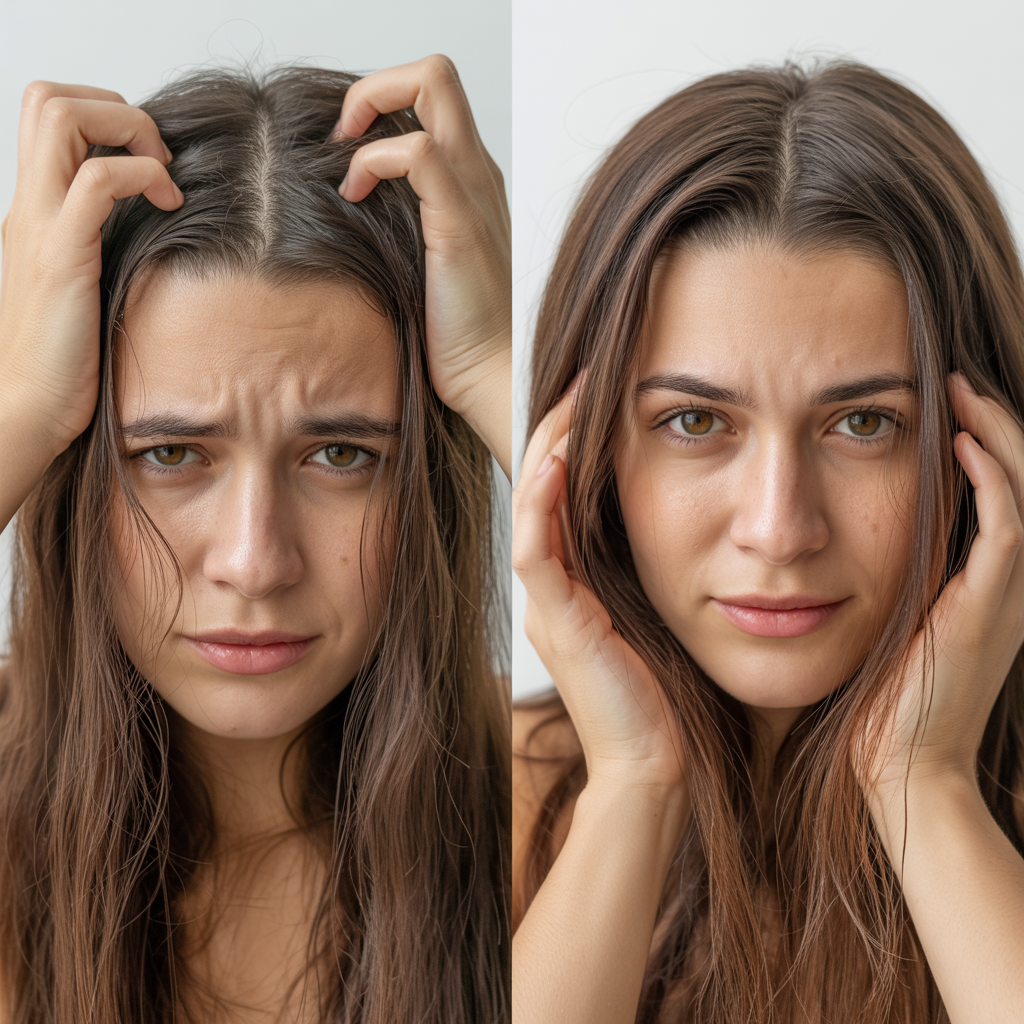
Food matters — not as a miracle cure, but as supportive care.
- Stay hydrated. Dehydration can reduce skin moisture, so drink adequate water.
- Key nutrients for scalp and hair health: iron, zinc, vitamin D, B vitamins (including biotin), and omega-3 fatty acids. Deficiencies can contribute to poor scalp condition and hair problems. Consult a clinician before supplementing. PMC
- Anti-inflammatory diet (plenty of vegetables, fatty fish, nuts, whole grains) can help inflammatory scalp conditions in some people.
- Avoid excessive vitamin A and selenium supplements — excesses can harm hair and scalp. Always follow recommended dosages. PMC
If you suspect a deficiency (fatigue, pallor, unusual hair shedding), get blood tests before supplementing.
When an Itchy Scalp Could Be a Medical Condition
See your clinician if you have any of the following:
- Severe, persistent itching >2–4 weeks despite home care.
- Large, painful, red, blistering, or oozing patches (possible infection).
- Rapid hair loss, patches of hair loss, or broken hairs (possible tinea capitis, alopecia areata).
- Thick silvery scales (psoriasis) or widespread severity needing prescription therapy.
- Systemic symptoms (fever, joint pain, widespread rash). Cleveland Clinic+1
A healthcare provider can examine, order tests (skin scrapings, cultures, bloodwork), and prescribe antifungal creams, medicated shampoos, topical steroids, or other treatments.
How to Treat Dandruff-Related Itching Naturally (and when to step up)
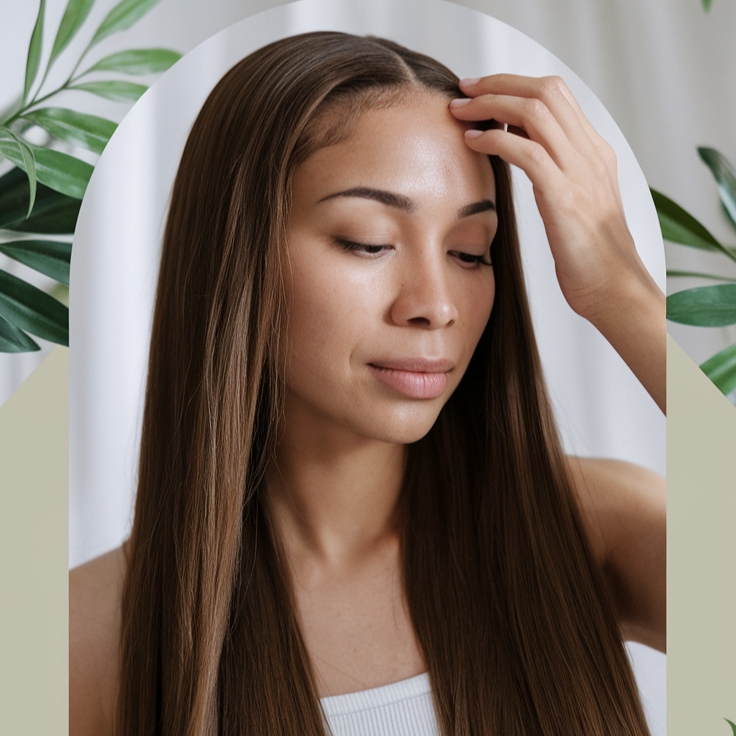
Natural first-line steps:
- Use ketoconazole or zinc pyrithione shampoo if mild dandruff — these are OTC medicated options (not strictly “natural” but often necessary). Use as directed for 2–4 weeks. Mayo Clinic
- Add tea tree oil diluted into shampoo or a gentle tea tree shampoo (patch test first). PubMed
- Use occasional ACV rinses and maintain regular cleansing to avoid buildup.
When natural measures aren’t enough: If flakes and itch persist despite 4–6 weeks of consistent care, see a dermatologist — you may need prescription topicals (stronger antifungals or topical steroids for flares). Mayo Clinic
Tips to Prevent Itchy Scalp in the Future (practical habits)
- Match your wash frequency to your scalp type (don’t overwash/dry out or underwash and let oil build). Mayo Clinic News Network
- Rotate products occasionally so the scalp doesn’t adapt and build residue.
- Avoid harsh chemical exposures (test dyes, avoid unknown “natural but strong” ingredients). American Academy of Dermatology
- Use gentle tools (soft brushes, fingertips for massage).
- Manage stress — stress and lack of sleep can worsen inflammatory scalps.
- Patch test new products before full application.
Frequently Asked Questions (FAQ)
Q: Can I use coconut oil every day?
A: Usually not necessary; 1× weekly as a pre-wash treatment is sufficient for most. Overuse can cause buildup.
Q: Is dandruff contagious?
A: No — dandruff and seborrheic dermatitis are not contagious. They’re linked to factors like yeast overgrowth, oil, and individual skin response. Cleveland Clinic
Q: Do essential oils really work?
A: Some (like tea tree) have evidence for helping dandruff when used diluted; overall evidence varies and oils are adjuncts, not guaranteed cures. Always dilute and patch-test. PubMed+1
Q: Will changing my diet cure my itchy scalp?
A: Diet helps support scalp health, but it’s rarely a standalone cure. If you suspect deficiency, get tested and treat any confirmed deficiency with professional guidance. PMC
Final Words
- Identify whether your itch is occasional or persistent (if persistent, especially with flakes/sores/ hair loss, see a clinician). Cleveland Clinic
- Start simple: adjust washing frequency, switch to a gentle (or medicated, if needed) shampoo, and try one gentle natural remedy (aloe, diluted tea tree, or an oatmeal mask) while patch-testing first. Mayo Clinic+1
- Prevent: avoid harsh products, keep the scalp clean but not stripped, and support skin health with proper hydration and a balanced diet. Mayo Clinic News Network+1


